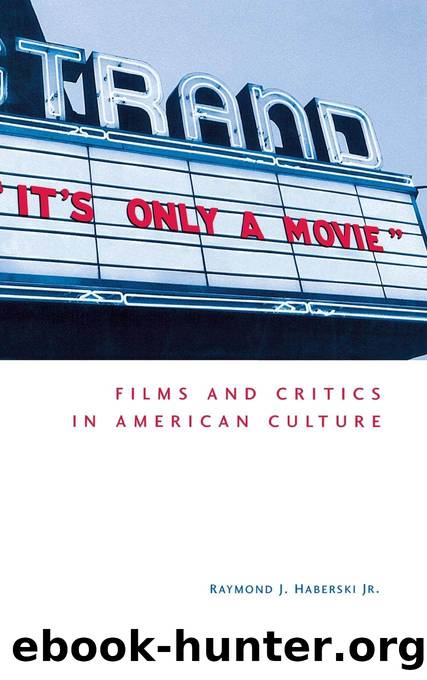It's Only a Movie! by Haberski Jr. Raymond J

Author:Haberski, Jr., Raymond J. [Haberski, Jr., Raymond J.]
Language: eng
Format: epub, azw3
ISBN: 9780813185217
Publisher: The University Press of Kentucky
Published: 2021-10-21T04:00:00+00:00
7
Andrew Sarris, Pauline Kael, and the Duel for the Soul of Criticism
American essayist Phillip Lopate remembers that as a nineteen-year-old student his passion for films ran very strong. In 1963 he agreed to run a film society at Columbia University and needed a way to justify his selections to a crowd of cinema enthusiasts. Lopate discovered his holy grail in the work of film critic Andrew Sarris. Sarris âseemed to cherish movies because they spoke to oneâs half-buried desires,â Lopate recalls fondly, âbut then cherished most those with an âadultâ (one of Sarrisâs favorite words) perspective, which acknowledged the necessity for sacrifice, whether gallant or otherwise.â Sarris was gallant and Lopate was smitten with him. For a slightly awkward college student with desires that tended toward the adolescent instead of the âadult,â discovering a kindred spirit in Sarris allowed Lopate to embrace movies in ways that seemed both intellectually daring and systematic. That effect on moviegoers underscored Sarrisâs unique style of criticism and sparked his meteoric rise to fame.1
By his own admission, Sarris was surprised and unprepared for such a reception. In the mid-1950s, Sarris had himself been a graduate student in English at Columbia University. In 1958, however, his life, somewhat like Lopateâs, was changed by the movies. Eugene Archer, a friend of Sarrisâs and fellow future movie critic, received a Fulbright Fellowship to study in Paris. Archer began spending an inordinate amount of time with the cinema radicals who gathered at the Cinémathèque Française and who wrote for Cahiers du Cinema. In letters he sent back to Sarris, Archer recounted discussions he had with this group about long-forgotten Hollywood directors. Intrigued, Sarris began reading the French film journal and was somewhat overwhelmed by the audacity of the French critics in treating Hollywood movies and directors with respect typically reserved for art and artists.2
Exposure to this criticism affected Sarris deeply. He writes, âa long sojourn in Paris in 1961 reassured me that film not only demanded but deserved as much faith as did any other cultural discipline.â Indeed, Sarris had experienced a religious conversion of sorts, remarking that he came to accept âthe sacred importance of the cinema.â But his new faith had made him, happily, ânot merely a cultist but a subversive cultist with a foreign ideology.â The element of foreignness was vital to Sarrisâs attraction to the French approach and the attractiveness of his own approach among movie enthusiasts in the United States. Rather than remain on the fringes of American movie culture, however, Sarris moved into the center of debates over criticism, taking his craft from the shadows of disrespect into the spotlight of popular relevance.
Two other trends also contributed to Sarrisâs rapid rise. First, just as he began publishing his first pieces of criticism using the auteur theory (as it came to be known), the French New Wave had begun to break over the United States. As Sarris remembers, âby the time the 1959 Cannes Film Festival introduced The 400 Blows, by a twenty-nine-year-old stormy
Download
This site does not store any files on its server. We only index and link to content provided by other sites. Please contact the content providers to delete copyright contents if any and email us, we'll remove relevant links or contents immediately.
Naked as Nature Intended by Pamela Green(451)
The Filmmaker's Guide to Creatively Embracing Limitations: Not Getting What You Want Leading to Creating What You Need (for True Epub) by Pace William & Stobbe Ingrid(444)
30 Movies to Get You Through the Holidays by Roger Ebert(417)
Bond, James Bond by Brad Gilmore(382)
It's Only a Movie! by Haberski Jr. Raymond J(349)
The Making Of Horror Movies by Jennifer Selway(327)
Chinese films in focus II by Unknown(309)
Smartphone Cinema: Making Great Films with Your Mobile Phone by Bart Weiss(309)
How To Write A Novel The Easy Way Using The Pulp Fiction Method To Write Better Novels: Writing Skills by Jim Driver(308)
The Fellowship of the Knits: Lord of the Rings: The Unofficial Knitting Book by Tanis Gray(304)
Film Truth; November, 1920 by Anonymous(287)
Charles McGraw by Alan K. Rode(284)
The Greatest Show on Earth by Jerry Pinto(282)
Thomas Mann and Friedrich Nietzsche: Eroticism, Death, Music, and Laughter by Caroline Joan Picart(275)
Jurassic Park and Philosophy by Watkins Jessica Michaud Nicolas(260)
The Romanian Cinema of Nationalism: Historical Films as Propaganda and Spectacle by Onoriu Colăcel(258)
The Garden in the Machine by Unknown(256)
Jafar Panahi: Interviews by Unknown(255)
The Reel Truth by Reed Martin(255)
